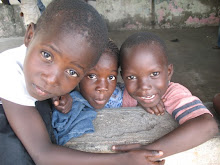
A busy week and lots of travelling. There are road improvements happening all around Accra which means, in the long term, that getting around will be much easier. In the short term it means grinding traffic jams, difficult bumpy temporary roads and long travelling times.
Inevitably then, when workshops in relatively far off places don't quite go to plan it's more frustrating for the workshop leaders who've sat in a rickety tro-tro for hours to get there.
Amasaman, which I mentioned earlier on this blog, is about 40/50km away from central Accra. It takes at least an hour to get there. Johnson, Nii and I made the journey on Thursday, starting out at 8am, for a day of workshops designed to select the participants for the forthcoming project there.
The man responsible for recruiting the potential participants in Amasaman is a man who likes to nod a lot. I'd been worried earlier in the week when, asked whether we'd have the right number of participants (40), from the correct five communities taking part in the project, at the right times, he had looked a little blank, stared ahead and nodded.
When we arrived he was still nodding, even more vigorously, with an even blanker expression on his face. When no-one turned up at 11am, he nodded some more. By 1pm we had 5 people, one of whom was too young anyway, and the nodding had finally stopped.
This isn't a normal situation for TfaC facilitators to find themselves in, but it's not unheard of either. Ensuring the work is in the hands of local stakeholders is an integral part of the company's ethos and it means that sometimes things don't happen as smoothly as they might if imposed from a heavily centralised organisation.

The diversity of the work also means that Theatre for a Change covers a much wider range of communities than they could otherwise. Unlike some forum theatre groups, TfaC don't just arrive in a community and perform, they become integral parts of each community, creating groups of local people, facilitated by local people, which then perform for people in the local area.
It's not an easy thing to do and there are inevitable hiccups on the way. Training people to train others to facilitate groups is a bit like pouring water from one bucket to another - there's always likely to be some spillage, some part of theory that doesn't reach its target.
At the same time, however, the exploratory nature of the practice gives those who are trained the opportunity to add in their own skills, experiences, local knowledge - which means that their methods are better suited to the communities in which they are working. It's a balancing act - a key part of which is the regular reviews which happen within workshops, in meetings and in the office.
Back in Amasaman and it's amazing how calmly Johnson and Nii deal with a difficult situation. They are both annoyed and frustrated, but it's difficult to tell. They are polite, professional, clear about how to resurrect the situation - planning new selection workshops for the weekend, talking to other local people who might be able to help find the young people who'll become the nucleus of the project.
All then that's left to do is clamber aboard another groaning tro-tro and head back through the dust and traffic to Accra.







